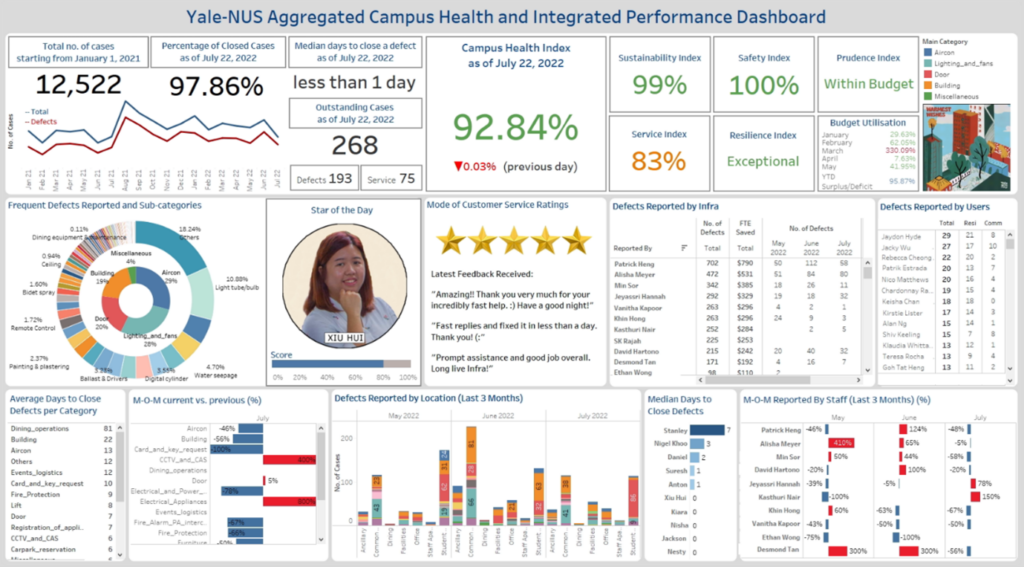Yale-NUS’ Infrastructure Office develops smart facilities management dashboard
Yale-NUS' infrastructure dashboard is recognised as an innovative case study by Singapore’s Building and Construction Authority

Photo of the Yale-NUS College Campus.
Recently, the Yale-NUS Infrastructure, Safety and Security Office was invited by the Building and Construction Authority (BCA) in Singapore to contribute a case study to their Smart Facilities Management (FM) guide.
The BCA guide was launched at the International Built Environment Week (IBEW) conference 2022 in early September this year. This is part of BCA’s ongoing efforts to encourage the industry to adopt smart facilities management – which refers to the integration of systems processes, technologies and personnel to enhance the management of the facilities of a building.
The Yale-NUS Infrastructure, Safety and Security Office shared about the development of the ‘Aggregated Infrastructure Health and Integrated Performance Dashboard’ in the case study. The dashboard is a smart platform that allows multiple users to embed and view real-time operations and maintenance data. For example, it tracks outstanding “live” cases, the volume of cases at different complexity levels, and even gives real-time appraisals of staff performance.
 A photo showing the interface of the Aggregated Infrastructure Health and Integrated Performance Dashboard. The dashboard provides real-time visualisation of aggregated campus health and integrated performance data. Image provided by Dennis Aw.
A photo showing the interface of the Aggregated Infrastructure Health and Integrated Performance Dashboard. The dashboard provides real-time visualisation of aggregated campus health and integrated performance data. Image provided by Dennis Aw.
With this information, managers can also dig deeper to discover patterns and gain meaningful insights that can enable better future resource planning or provide more early guidance to staff who may need more support. As a whole, the dashboard allows managers to not only intervene immediately to improve performance levels, but also make adjustments for the long-term.
Director of Infrastructure, Safety & Security Office Dennis Aw explained that in the facilities management industry, there is sometimes a perception that technology adoption is costly, has long implementation lead time and frequently becomes ineffective post-implementation. However, in the case of the dashboard, the technology is “practical, affordable, scalable” and was implemented in merely two months.
More importantly, the implementation of the dashboard has also yielded positive results. After the Infrastructure team began using the platform, they noted about a 20 per cent drop in the amount of defect-related reports from the College community, and a corresponding increase in the reports made by the Infrastructure team. This phenomenon illustrated the increasingly proactive maintenance actions by the Infrastructure team as they would remediate the defects before these were experienced by “end-users” in the community.
For example, a team officer noticed a water stain mark in the ceiling at a common area and reported it. This turned out to be a pinhole leak in a high pressure water pipe after investigations. Although the initial observation did not appear to be serious, it was important to pre-emptively address this as the small leak might have led to a burst pipe in the future, a more serious issue that would have required more time, resources and manpower to remedy. This early intervention is also important because it improves the lifespan of building infrastructure, and reduces potential resource waste.
Building the dashboard did not come without its challenges. Director Aw explained that his team struggled to find a vendor to build the dashboard while balancing the need to keep the costs affordable. After futile attempts, the team decided to build the dashboard themselves, with four existing staff members attending company-sponsored training in data analytics and software-related courses, so they would be able to make any required future changes to the platform.
Returning to the original reason the platform was developed in the first place, Director Aw shared that he was glad that his team’s focus on improving service at the College gave the team “energy and discipline to overcome the odds”.
In addition, the Infrastructure, Safety and Security Office undergoes the ISO 41001:2018 Facilities Management external audit every year to ensure validation and continuous improvement. The team’s efforts paid off as the College achieved the ISO 45001:2018 (Occupational Health and Safety) and ISO 14001:2015 (Environmental Management System) certifications, and also obtained re-certification of ISO 41001:2018 (Facilities Management System) this year. These achievements are testament to Yale-NUS’ commitment to standards of excellence.
With the success of this case study, the Yale-NUS Infrastructure, Safety and Security Office was able to not only achieve their original goals, but even use their example to impact the Facilities Management industry positively. Director Aw said, “I hope we are an inspiration to others and that the inclusion [in the guide] would spur us on to explore experimenting with facilities management digitisation in the space of Metaverse and Web 3.0.”





